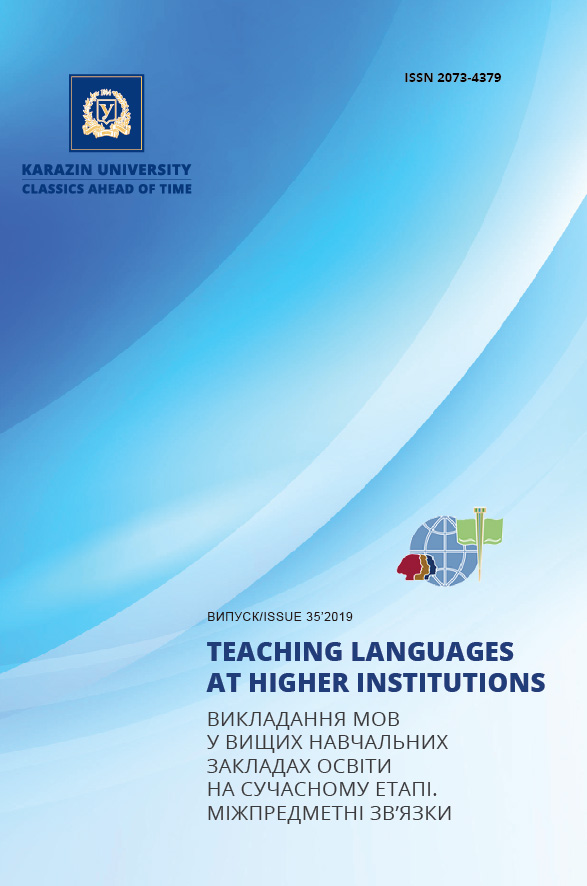Психологічні передумови звернення до художнього тексту в навчанні української мови як іноземної
Анотація
У статті порушено проблему залучення художнього тексту до навчального матеріалу з української мови як іноземної, зокрема необхідність врахування психологічних чинників під час роботи зі зразками красного письменства.
Окреслено психологічний та психолінгвістичний підходи до читання творів художньої літератури і їх використання в навчанні: повноцінне сприйняття художнього тексту можливе за умови перетину смислових полів тексту і смислових полів (перш за все емоційних) читача; активізація емоційної сфери (інтересу, емпатії, здивування, хвилювання, обурення тощо) сприяє ефективному розвитку мовленнєвих навичок і полегшує запам’ятовування лексичних одиниць та граматико-стилістичних норм їх уживання. Тому врахування інтересів іноземних студентів є визначальним фактором для добору художніх текстів та організації ефективної роботи з ними у процесі навчання української мови як іноземної.
Схарактеризовано специфіку комунікації «автор – художній текст – читач» у випадку іншомовного тексту: вона здійснюється за допомогою посередника – викладача. Він добирає актуальний для аудиторії твір, за необхідності адаптує, аранжує коментарем і системою завдань, зупиняє увагу читачів на важливих моментах, які здатні зацікавити й викликати дискусію, допомагає провести паралель між зображеним у тексті й життєвим досвідом студентів. Тобто викладач є модератором процесу читання, що допомагає наблизити художній простір твору до особистості іноземного читача.
Автор статті наводить приклади з власного досвіду навчання іноземців української мови з використанням творів художньої літератури. Зацікавлене читання та ефективне обговорення текстів можливе за умови особистісного інтересу студентів до порушених проблем, зображених подій, долі героїв, авторської позиції.
Завантаження
Посилання
Belyanin, V.P. (1988). Psihologicheskiye aspekty hudozhestvennogo teksta [Psychological aspects of the literary text]. Moscow: Izd-vo MGU [in Russian].
Collie, J. and Slater, S. (1990). Literature in the Language Classroom: A Resource Book of Ideas and Activities. Cambridge: CUP. URL: https://www.academia.edu/12529875/Literature_in_the_Language_Classroom_by_Joanne_Collie_and_Stephen_Slater [in English].
Macyuk, Z. (2006). Linhvokrayinoznavchyj potencial khudozhnikh tvoriv Romana Ivanychuka [The linguistic and country studies potential of Roman Ivanichuk's literary texts]. Teoriya i praktyka vykladannya ukrayinskoyi movy yak inozemnoyi [Theory and practice of teaching Ukrainian as a foreign language]. Lviv: LNU, 1, pp. 202–205 [in Ukrainian].
Maley, A. (1989). Down from the Pedestal: Literature as Resource. Literature and the Learner: Methodological Approaches. Cambridge: Modern English Publications, pp. 10–24 [in English].
Nastalovska, I.V. (2009). Tekstova paradyhma oryhinalnoho ta adaptovanoho tekstiv (na materiali anglomovnykh khudozhnikh tekstiv) [Textual paradigm of original and adapted texts (based on English texts of belle-lettres style)]. Extended abstract of candidate’s thesis. Odesa: Odesa I.I. Mechnikov National University [in Ukrainian].
Shherba, L.V. (1974). Prepodavanie inostrannyh jazykov v srednej shkole. Obshhie voprosy metodiki [Teaching foreign languages in school. General issues of the methods]. Moscow: Vyssha shkola [in Russian].
Shvets, H.D. (2019) Dyskusiinyj potentsial zhanru ese v navchanni ukrainskoyi movy yak inozemnoyi [Discussion potential of the essay genre in teaching Ukrainian as a foreign language]. Vykladannia mov u vyshchykh navchalnykh zakladakh osvity na suchasnomu etapi. Mizhpredmetni zviazky [Teaching Languages at Higher Institutions]. Kharkiv: V.N. Karazin Kharkiv National University, 34, pp. 258–272 [in Ukrainian].
Shvets, H.D., Torchynska, Yu.O. and Litvinchuk, A.O. (2012). Chytaimo ukrainskoyu: navchalnyi posibnyk z ukrainskoyi movy dlia inozemnykh studentiv [Letʼs read in Ukrainian: a textbook of Ukrainian for foreign students]. Kyiv: Feniks [in Ukrainian].
Stankevych, N.I. (2009). Khudozhnij tekst dlya chytannya v inshomovnij audytoriyi: vyroblennya stratehiyi rozuminnya [Literary text for reading in a foreign language audience: developing a comprehension strategy]. Vykladannya mov u vyshhykh navchalnykh zakladakh osvity na suchasnomu etapi. Mizhpredmetni zvyazky [Teaching Languages at Higher Institutions]. Kharkiv: V.N. Karazin Kharkiv National University, 14, pp. 202–210 [in Ukrainian].
Vygotskij, L.S. (1991). Pedagogicheskaja psihologija [Pedagogical psychology]. Moscow: Pedagogika [in Russian].
Yermolenko, S.Ya. (1999). Narysy z ukrayinskoyi slovesnosti: (stylistyka ta kultura movy) [Essays on Ukrainian Literature: (Stylistics and Culture of Language)]. Kyiv: Dovira [in Ukrainian].
Zubryczka, M. (2007). Chytach yak teoretychna katehoriya v kulturolohichnomu dyskursi XX storichchya [The reader as a theoretical category in the cultural discourse of the twentieth century]. Visnyk Lvivskoho universytetu. Seriya Zhurnalistyka [Bulletin of the University of Lviv. Journalism Series]. Lviv: LNU, 31, pp. 166–173 [in Ukrainian].

